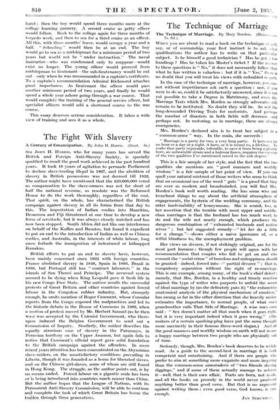The Technique of Marriage
Wm:sr you are about to read a book on the technique of golf, say, or of seamanship; your first instinct is to ask what qualifications the author has to write on that particular subject. Is he himself a good technician ? Has he got a low handicap ? Has he taken his Master's ticket ? If the answer to these questions is "No," it does not necessarily follow that what he has written is valueless : but if it is "Yes," there is no doubt that you will treat his views with redoubled respect.
In the case of the technique of marriage, however, you can. not without impertinence ask such a question : nor, if you were to do so, could it be satisfactorily answered, since it is not yet possible to take a Degree in Matrimony, and even the Marriage Tests which Mrs. Borden so strongly advocates still remain to be instituted. No doubt they will be. So will the long-demanded Driving Tests for motorists. And perhaps the number of disasters in both fields will decrease- -and perhaps not. In motoring, as in marriage, there are always emergencies.
Mrs. Borden's declared aim is to treat her subject in a " common-sense " way. In the main, she succeeds : "Marriage is a party for two, a very long party. It lasts not for an hour or a day or a night, it lasts, or it is meant to, a lifetime. To snake that party enjoyable, tolerable, to save it from being a ghastly bore, an unbearable strain and a hideous fiasco, requires the exercise of the two qualities I've mentioned raised to the nth degree."
This is a fair sample of her style, and the fact that the two qualities she mentions are "good manners And worldly wisdom" is a fair sample of her point of view. If you can quell your natural mistrust of those writers who seem to think that an occasional use of the word" guts " is a proof that they are ever so modern and broadminded, you will find Mrs. Borden's book well worth reading. She has some wise and trenchant things to say about the artificial atmosphere of engagements, the hysteria of the wedding ceremony, and the utter inadvisability of honeymoons. She is sound, too, in her assertion that the trouble with most upper and middle- class marriages is that the husband has too much work to do and the wife not nearly enough, which produces the dangerous combination of "exhausted husbands and restive wives " ; but her suggested remedy—" let her do a little for a change "—shows either a naive ignorance of, or a wilful blindness to, the unemployment problem.
Her views on divorce, if not strikingly original, are for the most part humane : though few people will agree with her recommendation that couples who fail to get on and who commit the "social crime" of boredom and unhappiness should be granted—indeed, forced into—" partial divorce " : that is, compulsory separation without the right of re-marriage. -This is one example, among many, of the book's chief defect : namely, that Mrs. Borden, in a healthy and timely reaction against the, type of writer who purports to unfold the secret of ideal marriage by (asshe delicately puts it) "the exhaustive anatomical analysis of the physical mechanism of emotion," has swung so far in the other direction that she heavily under- estimates the importance, to normal people, of what one's grandmother calls That Side of Marriage. A wise Inas once said : "Sex doesn't matter all that much -when it goes right, but it is very important indeed when it goes wrong." (The makers of a certain sparking-plug have put the same thought more succinctly in their famous three-word slogan.) And all the good manners and worldly wisdom on earth will not insure a happy marriage between two people who are physically out of tune. - Seriously, though, Mrs. Borden's book deserves to be widely read. As a guide to the second-best in marriage it is both -competent and entertaining. And if there are people who -prefer to aim at something more exquisite and more inspiring than the 'common-sense camaraderie of "two friends sharing diggings," and- if some of them actually manage to achieve it—well, -that is their own affair. Poets are born, not made, and- all the books on prosody in the world never produced anything better than good verse. But that is no argument against' 'writing them even good verse, God knows, is rare enough.
JAN STRLITHER.




































 Previous page
Previous page